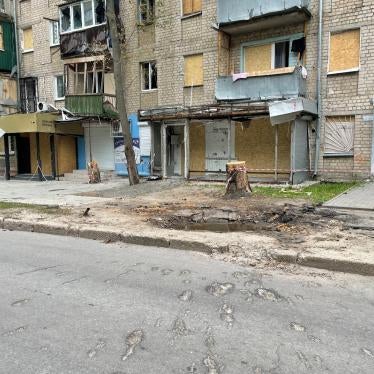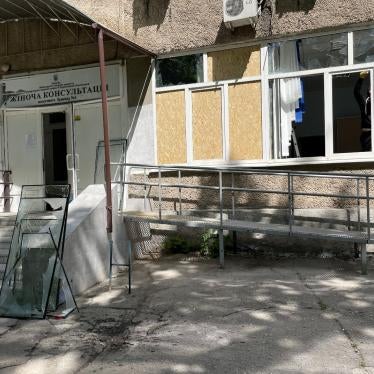(Geneva, September 20, 2022) – A new international declaration aimed at curbing harm from the bombing and shelling of villages, towns, and cities is a major milestone for protecting civilians during armed conflict, Human Rights Watch said today.
The Declaration on the Protection of Civilians from the Use of Explosive Weapons in Populated Areas will be opened for countries to endorse at a high-level signing conference hosted in Dublin by the government of Ireland on November 18, 2022.
“All countries should seize this opportunity to prevent human suffering in armed conflict by endorsing the new declaration to limit the use of explosive weapons in populated areas,” said Steve Goose, arms director at Human Rights Watch. “This political commitment sends a strong message that the civilian toll from the widespread use of explosive weapons in populated areas is unacceptable.”
Explosive weapons, such as aerial bombs, rockets, artillery and mortar projectiles, and missiles, if used in populated areas, not only kill and injure civilians at the time of attack, but also have long-term ripple, or “reverberating,” effects. These weapons damage civilian infrastructure, which in turn interferes with basic services such as health care and education, infringing on human rights. They inflict psychological harm, cause environmental damage, and displace communities.
The bombing and bombardment of cities and towns has generally become less accepted since World War II, but the practice endures, causing thousands of civilian casualties each year.
The use of explosive weapons in populated areas has inflicted immediate and long-term harm on civilians in Armenia, Azerbaijan, Ethiopia, Iraq, Libya, Syria, Ukraine, Yemen, and in other conflicts in recent years. Since its all-out invasion on February 24, 2022, Russia has repeatedly shelled and bombed Ukrainian cities, towns, and villages with explosive weapons that have a large destructive radius, are inherently inaccurate, or deliver multiple munitions at the same time. Such factors create wide area effects that make these explosive weapons an inappropriate choice for use in populated areas as they pose a heightened risk of harm to civilians.
Under the declaration, states commit to adopt and carry out national policies and military practices that strive to avoid civilian harm by “restricting or refraining from” the use of explosive weapons in towns, cities, and other populated areas. Countries should refrain from using explosive weapons with wide area effects in populated areas and should restrict the use of other explosive weapons.
Other key provisions include commitments to assist victims, facilitate humanitarian access, and collect and share data about the effects of explosive weapons.
The explosive weapons declaration responds to a proven and devastating pattern of harm caused to civilians, which drives people from their homes and causes them to lose their lives and livelihoods. It goes beyond simply restating existing international law by committing signatories to take additional steps that improve the protection of civilians, address the humanitarian consequences, and strengthen compliance with international humanitarian law, or the laws of war.
Countries have adopted many declarations relating to the conduct of armed conflict and use of weapons. For example, the 2015 Safe Schools Declaration, endorsed by 114 countries, seeks to restrict the military use of schools and keep children in school during conflicts. Since 2006, 30 countries have endorsed a Declaration on Anti-Vehicle Mines that was negotiated after failure to reach consensus on concluding a legally binding instrument on antivehicle landmines.
The diplomatic process to create the explosive weapons declaration began when 133 countries participated in a conference on Protecting Civilians in Urban Warfare hosted by Austria in October 2019. Ireland then convened two rounds of diplomatic consultations on the text in 2019 and 2020. The Covid-19 pandemic postponed negotiations until early 2022.
Governments agreed to the final text of the draft declaration on the use of explosive weapons in populated areas at the United Nations in Geneva on June 17, 2022. Many of the more than 70 countries that participated in negotiating the explosive weapons declaration have expressed their intent to sign it on November 18 or are working toward that decision.
The process to conclude the declaration has featured close partnership among countries, United Nations agencies – notably the Office for the Coordination of Humanitarian Affairs (OCHA) – and the International Committee of the Red Cross (ICRC), and civil society organizations. Human Rights Watch is a cofounder of the International Network on Explosive Weapons, a coalition of groups that has pushed for such a declaration since 2011.
The political declaration creates a platform for future work, including regular meetings to promote the commitments that it sets out. The meetings would provide a forum to present and review data tracking civilian harm in military operations and consider efforts for addressing it.
While not legally binding, political declarations carry significant weight because they can help clarify existing international law’s applicability to a specific situation or outline standards for conduct that go beyond existing law. In doing so, political declarations can positively shape state behavior and help advance common goals.
“The declaration on explosive weapons provides a strong starting point for future work to better protect civilians during wartime,” Goose said. “To have a positive impact over the long-term, its signatories should ensure that they have the necessary policies, practices, and procedures in place for its robust implementation.”








